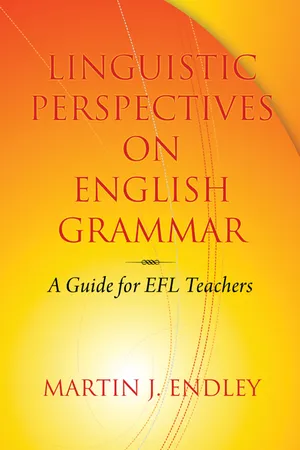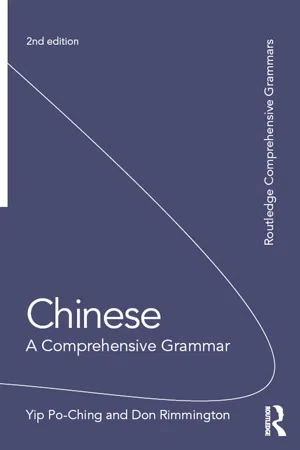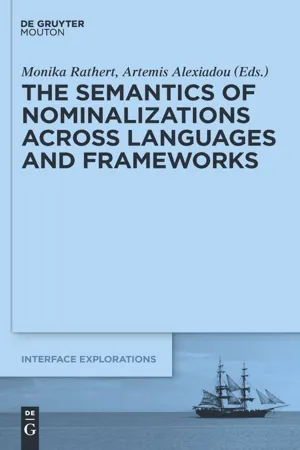Languages & Linguistics
Action Verbs
Action verbs are words that express physical or mental action, or a state of being. They are essential for conveying action and movement in a sentence. In English grammar, action verbs are used to show what the subject of the sentence is doing. Examples of action verbs include "run," "eat," "think," and "sleep."
Written by Perlego with AI-assistance
Related key terms
1 of 5
4 Key excerpts on "Action Verbs"
- eBook - PDF
- Martin J. Endley(Author)
- 2007(Publication Date)
- Information Age Publishing(Publisher)
Linguistic Perspectives on English Grammar, pages 39–75 Copyright © 2010 by Information Age Publishing All rights of reproduction in any form reserved. 39 2 Verbs and Verb Phrases in Linguistic Perspective In this chapter, I turn to the other major syntactic category in English, the verb. The plan for this chapter is as follows. I begin by trying to establish more precisely what a verb is and what purposes verbs serve when viewed in linguistic perspective. Here, I discuss the important idea that verbs play a central role in describing particular “situations.” After that, I discuss the very important closed class of so-called primary verbs, which have a very high frequency in modern English and can appear either as main verbs or as auxiliaries. As we will see, it makes sense to treat these as a distinct group on the basis of their morphosyntactic properties. Much of the remainder of the chapter is devoted to a detailed discussion of the especially interesting group of “multi-word” verbs. These are a striking feature of modern Eng- lish and are widely recognized as presenting a particular challenge to non- native English speakers. In consequence, the nature of these challenges, in- volving both problems of form and problems of meaning, will be discussed at some length. 40 Linguistic Perspectives on English Grammar What Are Verbs? A traditional answer to this question would say that verbs are words that de- scribe or identify actions and events. There is much to be said for this view. Verbs often do this, providing descriptions of perceptually accessible events that often involve physical motion or action and, frequently, rapid change. Yet, as with nouns, it does not take long to see that many verbs do not fit this definition and that it really only works with what are called dynamic verbs such as walk, run, jump, and so on. This way of thinking about verbs is much less effective for state or psych verbs such as know, want, hope, and numerous others. - eBook - PDF
- Yip Po-Ching, Don Rimmington(Authors)
- 2015(Publication Date)
- Routledge(Publisher)
Chapter 6 Action Verbs Action verb is a portmanteau term used here to cover all the verbs in the language apart from non-Action Verbs such as 是 shì ‘to be’ and 有 ysu ‘to have’ and verbs of emotion or cognition. Their major distinctive feature is that they generally indicate transient performance. Therefore, they are more narrative or descriptive, recounting past events or depicting ongoing actions, whereas non-Action Verbs tend to register more or less permanent states or characteristics and are therefore more expository. In other words, Action Verbs play a more prominent role in narration or description, while non-Action Verbs focus more on explanation. This, of course, does not imply that Action Verbs cannot be used for purposes other than narration or description, but there is a clear distinction between the subject of an action verb predicate and the topic of a comment expressed by 是 shì ‘to be’, 有 ysu ‘to have’ or an emotional or cognitive verb. In the former case, the subject either initiates or tolerates the action encoded in the predicate, while in the latter, the topic is linked to further explanations expressed in the comment. Compare the following. subject–predicate structures: aaaaaaaws chh le yh wpn miàn (narrative) I ate a bowl of noodles. aaaaaaaatf shiudào le lipng fgng xìn (narrative) He received two letters. aaaaaaamèimei zài tán gfngqín (descriptive) My younger sister is playing the piano. topic–comment structures: aaaaaaaws shì dàxué jiàoshh (expository) I am a university teacher. 108 109 Action Verbs aaaaaaatf ysu lipng ge dìdi (expository) He has two younger brothers. aaaaaaaaggge xrhuan hg píjit (expository) My elder brother likes drinking beer. We will pick up these differences again in later chapters, and, in particular, in Chapter 20, but here, we will focus on the intrinsic features of Action Verbs: their diverse structural categories and their formal and semantic relations with the subject and the object. - eBook - PDF
Critical Stylistics
The Power of English
- Lesley Jeffries(Author)
- 2017(Publication Date)
- Red Globe Press(Publisher)
CHAPTER Representing Actions/ 3 Events/States ❚ 3.1 Introduction In Chapter 2 I argued that naming is the linguistic process by which people, places and things are typically identified in language, including the (mainly adjectival) ways in which such entities can be characterized and the ideological consequences of this. In this chapter, we consider a descriptive analysis based on the notion that the verbal element of a clause – also known as the Predicator – is where the actions and processes that take place between these entities are typically represented. A writer or speaker has the power to choose the words that suit her/his pur-pose most closely, and this includes the choice of a lexical verb which will present the situation in the way that the author (speaker) desires. The polit-ician who wishes to get votes may choose to describe the economic problems of her/his country as an event ( world markets are falling ), her/his opponent may describe it as an action ( the Honourable Member has ruined the economy ) and a commentator may choose to describe it as a state of affairs ( the world economy is in crisis ). Each of these choices has consequences for the way in which the situation is seen by the reader/hearer and though these may be subtle, and in some cases overcome by the reader with a critical attitude to the language itself, nevertheless, we are all susceptible to the nuances of those who speak to us, whether from a podium or from a news editorial. ❚ 3.2 A linguistic model of representing actions/ events/states At the centre of this book’s argument is the view that language has some typical form–function relations which help it to be stable enough to use, 38 CRITICAL STYLISTICS but that these relations are also flexible enough to allow meaning to flourish (see Introduction). - Monika Rathert, Artemis Alexiadou, Monika Rathert, Artemis Alexiadou(Authors)
- 2010(Publication Date)
- De Gruyter Mouton(Publisher)
The verbs at issue 5 Cf. Bisetto and Melloni (2007) for a first elaboration of this taxonomy. Action nominals inside: lexical-semantic issues 147 are to be found among Verbs of Assembling and Combining, Speech Act and Mental Action Verbs (and in general Verbs with Predicative Comple-ments), Verbs of Sound and Light Emission, Verbs of Appearance, Verbs of Cooking (cf. again Levin 1993), etc. Many among these verbs can be as-cribed to the class of Result-Object verbs, although with subtle semantic and syntactic peculiarities that cannot be discussed here because of space limitation (cf. Melloni 2007 for further elaboration on the issue). Creation by Representation Verbs lexicalize situations expressing the coming into being of an entity, which is a representation of the Source ar-gument, typically mapped onto the direct object position. Verbs in this class are copiare ‘copy’, falsificare ‘falsify’, imitare ‘imitate’, rappresentare ‘represent’, riscrivere ‘re-write’, tradurre ‘translate’, trascrivere ‘transcribe’, an so forth (cf. also Performance Verbs, Levin 1993: 178). While these verbs project internal arguments corresponding to “Representation Source Themes”, RSTs (cf. Dowty 1991), their derived nominals lexicalize the effected object, hence a representation of the RST. Let us consider the case of traduzione ‘translation’: (6) L’editore chiese la revisione di una traduzione (del saggio) zeppa di refusi ed imprecisioni . ‘The editor asked for the revision of a translation (of the essay) full of mistakes and inaccuracies.’ It is worth emphasizing that the nominal lexicalizes a non-syntactic partici-pant, which could suitably be defined as a semantic or root argument .
Index pages curate the most relevant extracts from our library of academic textbooks. They’ve been created using an in-house natural language model (NLM), each adding context and meaning to key research topics.



